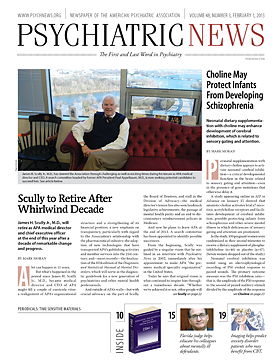Perinatal supplementation with dietary choline appears to activate neonatal cerebral inhibition—a critical developmental function in the brain related to sensory gating and attention—even in the presence of gene mutations that otherwise delay it.
A study appearing online in AJP in Advance on January 15 showed that amniotic choline activates fetal a7-nicotinic acetylcholine receptors and facilitates development of cerebral inhibition, possibly protecting infants from schizophrenia and other severe mental illness in which deficiencies of sensory gating and attention are prominent.
In the study, 100 pregnant women were randomized in their second trimester to receive a dietary supplement of phosphatidylcholine (n=46) or placebo (n=47). (Seven women dropped out of the study.)
Neonatal cerebral inhibition was tested using an electrophysiological recording of P50 evoked response to paired sounds. The primary outcome measure was the P50 inhibition ratio—that is, the amplitude of the P50 response to the second of paired auditory stimuli divided by the amplitude of the responseto the first stimulus; a smaller ratio indicates an inhibition of the cerebral response to the repeated stimulus and serves as a proxy for healthy development of sensory gating and attention.
Seventy-six percent of the infants whose mothers received choline supplementation were found to have intact cerebral inhibition according to the electrophysiological test, compared with just 43 percent of the infants whose mothers took placebo.
Moreover, a genotype associated with schizophrenia known as CHRNA7 was correlated with diminished P50 inhibition in the infants of the placebo group, but not in the infants of the choline group.
Ameri can Journal of Psychiatry (AJP) Editor in Chief and senior author of the study Robert Freedman, M.D., told Psychiatric News the findings suggest that dietary supplementation with choline may improve brain function in infants who are genetically at risk for schizophrenia.
“The hypothesis that improving prenatal brain development might decrease schizophrenia in later life merges decades of clinical observation of infants who later developed schizophrenia with recent findings that many genes that increase risk for schizophrenia have roles in fetal brain development,” Freedman said. “It is fortunate that the developmental effects of one gene variant associated with schizophrenia appear to be lessened in newborns by choline, a common nutrient for which many women are deficient. This step is hopefully one of many, with others needed to track these infants over time and to determine the effects of populationwide prenatal interventions on the ultimate development of schizophrenia as well as other neurodevelopmental psychiatric disorders.”
In an editorial appearing in the March issue of AJP, in which the study will be published in print, psychiatrist Judith Rapoport, M.D., of the Child Psychiatry Branch at the National Institute of Mental Health, noted that prevention through maternal diet during pregnancy has been successful on rare previous occasions, most notably for neural tube defects, which are best prevented by supplementing the maternal diet with folic acid. “While [the study authors] acknowledge that their choline study is not powered or planned to address prevention of schizophrenia, it represents a landmark proof of concept showing that such an approach might be possible,” she said.
The study was supported by the Institute for Children’s Mental Disorders, the Anschutz Family Foundation, and grants from the National Institutes of Health and by the American Academy of Child and Adolescent Psychiatry Elaine Schlosser Lewis Fund. ■
